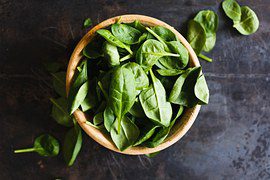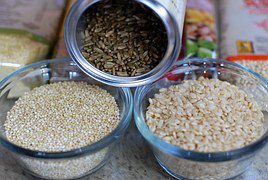
My transformative journey into vegetarianism was born out of sheer desperation. I wanted to feel better and decided to take a closer look at the food I was consuming. It basically started as an elimination diet back in 1999. That was the year that I decided to totally eliminate meat from my diet, and my life would forever be changed. That was more than two decades ago.
Today, plant-based nutrition has gained significant popularity due to its numerous health benefits and positive impact on the environment. I am a strong supporter of a plant-based diet and believe that many of the health conditions folks have today could be remedied by way of their diet. In fact, plant-based nutrition is the core of my health coaching practice. So, it’s essential that I dispel the common misconception that plant-based diets lack protein. In fact, there are plenty of protein sources available that can meet and even exceed our protein needs.
This post provides a list of benefits of a plant-based diet and offer a variety of plant-based protein sources that can provide adequate protein while enjoying a diverse and delicious plant-based lifestyle.
A plant-based diet offers a plethora of benefits for both our health and the environment. Contrary to the misconception that plant-based diets lack protein, there is a wide array of plant-based protein sources that can easily meet our protein needs.
Whether you follow a vegetarian or vegan lifestyle or you’re simply gathering information for future dietary changes, this post will shed light on the diverse and delicious plant-based protein sources available. There are lots of protein-rich plant foods that deliver adequate protein and offer numerous health benefits through a plant-based lifestyle.
Benefits of a Plant-Based Diet:
A plant-based diet provides several notable benefits, including improved overall health, weight management, reduced risk of chronic diseases, and a positive environmental impact. By focusing on whole, plant-based foods, you can experience an increase in the following:
Nutritional Profile:
- When you adopt a plant-based lifestyle, you’re naturally loading up on fiber, vitamins, minerals, and antioxidants that are essential for your health. These incredible nutrients work together to support your overall well-being, boost your immune system, and even help prevent a variety of diseases.
Fiber:
- Plant-based foods are packed with dietary fiber, which plays a vital role in digestion and maintaining a healthy gut. It helps regulate bowel movements, promotes satiety, and assists in managing weight. Additionally, fiber is beneficial for heart health by helping to lower cholesterol levels and reduce the risk of cardiovascular diseases.
Vitamins:
- Plant-based diets provide a wide array of vitamins that are essential for various bodily functions. You’ll find abundant amounts of vitamin C in fruits like oranges, strawberries, and kiwis, which are powerful antioxidants that support your immune system and help protect against oxidative stress. Leafy greens like spinach and kale are excellent sources of vitamin K, which is important for blood clotting and bone health. And don’t forget about the B vitamins found in legumes and whole grains that help convert food into energy and support brain function.
Minerals:
- Plant-based foods offer a rich assortment of minerals necessary for optimal health. Leafy greens, nuts, and seeds provide an abundance of magnesium, which is involved in hundreds of biochemical reactions in the body, including energy production and nerve function. Meanwhile, legumes and fortified plant-based milk are fantastic sources of calcium, promoting healthy bones and teeth. Iron, crucial for carrying oxygen throughout the body, can be obtained from sources such as lentils, tofu, and spinach.
Antioxidants:
- Fruits, vegetables, and other plant-based foods are packed with antioxidants that help protect your cells from damage caused by harmful free radicals. These antioxidants, including vitamins A, C, and E, along with phytochemicals like carotenoids and flavonoids, contribute to reducing inflammation, fighting off chronic diseases, and supporting a healthy aging process.
Adopting a plant-based diet provides you with an enhanced nutritional profile that supports your overall health, strengthens your immune system, and helps prevent various diseases. By embracing the abundance of fiber, vitamins, minerals, and antioxidants found in plant-based foods, you’re nourishing your body and giving it the best chance to thrive. Prepare for more vibrant health and a delicious plant-powered lifestyle!
There’s More…
Weight Management:
Plant-based diets are generally lower in calories and saturated fats while being higher in fiber. This combination can aid in weight management, promoting healthy weight loss or maintenance.
Reduced Risk of Chronic Diseases: Research suggests that a plant-based diet is associated with a lower risk of heart disease, high blood pressure, type 2 diabetes, certain cancers, and obesity. The abundance of nutrients and the absence of unhealthy animal fats contribute to these protective effects.
Plant-based diets naturally lend themselves to portion control, as plant foods tend to be lower in calorie density compared to animal-based foods. Filling your plate with colorful fruits, vegetables, whole grains, and legumes can help you feel satisfied while consuming fewer calories, aiding in weight management.
High in Fiber:
One of the key secrets to weight management lies in the power of dietary fiber, and plant-based diets are abundant in this essential nutrient. Foods like whole grains, fruits, vegetables, and legumes provide ample fiber, which adds bulk to your meals, enhances satiety, and promotes healthy digestion. By keeping you fuller for longer, fiber helps curb excessive snacking and overeating, supporting weight loss or maintenance.
 Nutrient Density:
Nutrient Density:
- Plant-based diets offer a treasure trove of nutrient-dense foods that nourish your body while keeping calorie intake in check. Focusing on whole, minimally processed plant foods ensures you receive a wide range of essential vitamins, minerals, and antioxidants, all while avoiding excessive saturated fats and empty calories that can hinder weight management efforts.
Reduced Consumption of Processed Foods:
- A plant-powered lifestyle encourages a shift away from heavily processed foods that are often high in added sugars, unhealthy fats, and empty calories. By minimizing your intake of processed snacks, fast food, and sugary beverages, you eliminate potential stumbling blocks to weight management and instead nourish your body with wholesome, nutrient-rich options.
Embracing Healthy Fats:
- While plant-based diets typically limit saturated fats found in animal products, they emphasize the inclusion of healthy fats such as those found in avocados, nuts, seeds, and plant-based oils. These unsaturated fats provide satiety, support brain function, and promote heart health, all while helping you maintain a healthy weight.
Active Lifestyle and Exercise:
- A plant-based diet can be complemented by an active lifestyle, reinforcing your weight management journey. Engaging in regular physical activity, whether through joyful pursuits like dancing, yoga, or outdoor adventures, synergizes with the nourishing power of plant-based foods, helping you maintain a healthy weight and overall well-being.
As we conclude this exploration of the weight management benefits of a plant-powered lifestyle, remember that adopting a plant-based diet offers a holistic approach to achieving and maintaining a healthy weight. From the natural portion control and high fiber content to the nutrient density and reduced consumption of processed foods, a plant-powered lifestyle can empower you on your weight management journey. Embrace the wisdom and insights shared here, and let the abundant flavors and nourishment of plant-based foods guide you towards vibrant health and balanced weight management. Cheers to your plant-powered success!
Plant-Based Protein Sources:

Plant-Based Protein Sources
- Legumes: Beans, lentils, chickpeas, and peas are exceptional sources of protein, fiber, iron, and other essential nutrients. Incorporate them into soups, stews, salads, and even create delicious plant-based burgers or falafels.
- Whole Grains: Quinoa, brown rice, oats, and whole wheat products not only provide complex carbohydrates but also offer substantial amounts of protein. Enjoy protein-rich meals like quinoa salads, nutty oatmeal, or stir-fried brown rice.

- Plant-Based Protein Alternatives: Tofu, tempeh, seitan, and plant-based meat substitutes made from soy or pea protein are versatile protein sources. Use them in a variety of dishes, such as stir-fries, curries, sandwiches, or wraps, for a delicious and satisfying plant-based meal.
By incorporating these protein-packed plant foods into your diet, you can more easily meet your protein requirements while relishing the diverse flavors and textures that a plant-based lifestyle offers.
The amount of protein you require largely depends on your age, activity level, muscle mass, and general health.
People who are physically active, as well as older adults, have significantly increased protein requirements.
Additional Benefits
Lowered Risk of Chronic Diseases:
One of the most significant benefits of a plant-based diet is its potential to prevent and manage chronic diseases. By reducing or eliminating animal products, saturated fats, and cholesterol from your diet, you can lower your risk of heart disease, stroke, certain cancers, and other chronic conditions. The abundance of fiber, antioxidants, and phytonutrients in plant-based foods works synergistically to support overall well-being and protect against inflammation and oxidative stress.
Environmental Sustainability:
Choosing a plant-based diet contributes to the sustainability of our planet. Animal agriculture is a significant contributor to greenhouse gas emissions, deforestation, water pollution, and depletion of natural resources. By shifting towards plant-based eating, you reduce your carbon footprint and help preserve biodiversity, conserve water, and combat climate change. Every plant-based meal becomes an act of environmental stewardship.
Ethical Considerations and Animal Welfare:
For those with a compassionate spirit, a plant-based diet aligns with ethical considerations and promotes animal welfare. By reducing or eliminating animal products from your diet, you actively support a more compassionate world, where animals are treated with kindness and respect. Plant-based eating allows you to live in harmony with your values and make a positive impact on the lives of animals.
A plant-based diet offers numerous health benefits, including improved overall well-being, weight management, and reduced risk of chronic diseases. Despite misconceptions, there are plentiful plant-based protein sources available to support adequate protein intake. By embracing legumes, whole grains, and plant-based protein alternatives, you can enjoy a diverse and delicious plant-based lifestyle while meeting your protein needs. Embrace the benefits of a plant-based diet and let these protein-rich plant foods nourish you towards a healthier and more sustainable way of living.
Here’s an easy-to-follow recipe that incorporates legumes into a delightful and nutritious dish:
Recipe: Mediterranean Chickpea Salad
Ingredients:
- 1 can of chickpeas (15 oz), drained and rinsed
- 1 cup cucumber, diced
- 1 cup cherry tomatoes, halved
- 1/2 cup red onion, finely chopped
- 1/4 cup Kalamata olives, pitted and sliced
- 1/4 cup fresh parsley, chopped
- 2 tablespoons extra-virgin olive oil
- 2 tablespoons lemon juice
- 1 clove garlic, minced
- Salt and pepper to taste
Instructions:
- In a large bowl, combine the chickpeas, cucumber, cherry tomatoes, red onion, Kalamata olives, and fresh parsley.
- In a separate small bowl, whisk together the extra-virgin olive oil, lemon juice, minced garlic, salt, and pepper to make the dressing.
- Pour the dressing over the chickpea mixture and toss gently to coat all the ingredients.
- Allow the salad to marinate in the refrigerator for at least 30 minutes to let the flavors meld together.
- Serve chilled and enjoy the Mediterranean goodness of this refreshing and protein-packed chickpea salad.
This Mediterranean Chickpea Salad is not only simple to prepare but also bursting with vibrant flavors and nutrient-rich ingredients. It makes for a satisfying lunch or a delightful side dish. Feel free to customize it by adding additional vegetables or herbs to suit your taste preferences. I hope you enjoy, but also share this plant-based creation with others.

 Nutrient Density:
Nutrient Density:
